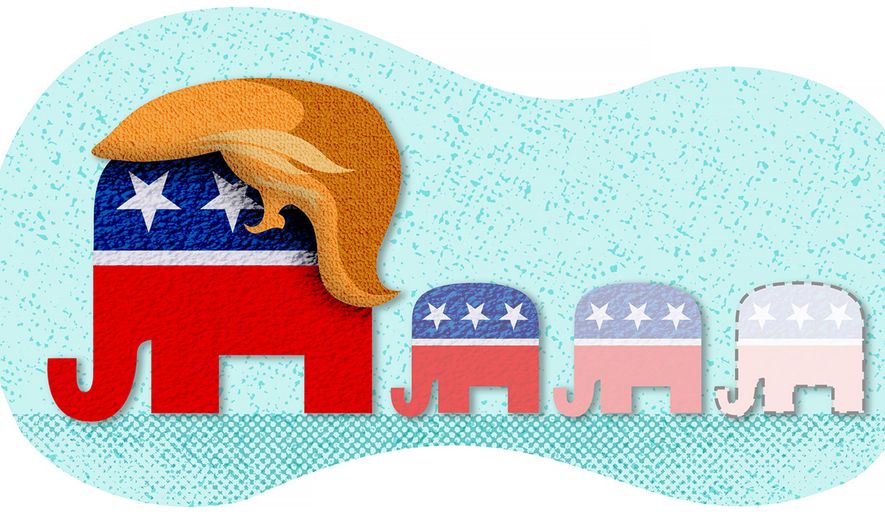OPINION:
If you listen to left-wing media, you’d think Republican voters across the nation are lemmings hanging on every word of former President Donald Trump. You’d be led to believe troglodyte GOP primary voters sit around waiting for a decree from Mar-a-Lago before heading to the polls.
On the other hand, if you’re a consumer of right-of-center or conservative media, you’ve heard for weeks about the running tally of the former president’s win record. Mr. Trump is 40 and 0 or 88 and 2 or 432 and 6 or something has become a frequent refrain from talking heads.
First, some reality is in order. The former president clearly has influence, but the vast majority of the races where he’s made his preferred candidate known were not highly competitive.
The results at the polls thus far however reveal a Republican Party that is far from monolithic when it comes to Mr. Trump’s choices in hotly contested races. Voters have demonstrated a degree of discernment and independence that blunt the popular narratives, while still embracing much of the former president’s agenda.
In Ohio, the former president, likely after lobbying by tech executive Peter Thiel, took Senate candidate J.D. Vance from fourth place to a victory buoyed by his endorsement. But it was a tough sell. Mr. Vance polled a mere 31% of the vote to win in the Buckeye State, meaning nearly 70% of the Republican primary voters chose someone other than the Trump-endorsed candidate.
Any all-powerful MAGA king would have had the Pennsylvania Senate race wrapped up without much of a fight, but that didn’t happen.
The race between Trump-endorsed Dr. Mehmet Oz and finance executive David McCormick was so brutal that it gave rise to a late-charging third candidate, conservative commentator Kathy Barnette. Ms. Barnette and Mr. McCormick combined to pull more than 50% of the primary voters.
As in Ohio, for conservative primary voters, their skepticism about the celebrity doctor’s bona fides made it a grueling horse race and Mr. Trump’s endorsement didn’t prevent that.
Gubernatorial candidate Doug Mastriano was already well ahead when Mr. Trump endorsed him late in the primary campaign.
In Idaho, where Mr. Trump inexplicably weighed in on the governor’s race, his controversial candidate Lt. Gov. Janice McGeachin went down in flames, losing by 20 points. Voters there knew full well Mr. Trump was backing Ms. McGeachin. They simply didn’t care. They knew Gov. Brad Little was a conservative and has governed like one.
Then there’s Georgia, where Mr. Trump went all-in to oust conservative Gov. Brian Kemp. A manufactured primary challenge that appeared to be a purely vindictive move by the former president was rejected by GOP voters by nearly 50 points. Voters know a reliable conservative when they see one.
The discernment was also seen in Mr. Trump’s attempt to tank Rep. Mo Brooks in his Senate primary against the former chief of staff to Sen. Richard Shelby, Katie Britt. Mr. Trump had backed Mr. Brooks but then rescinded his endorsement saying he’s “gone woke.”
Mr. Brooks managed to force a runoff anyway garnering nearly 30% of the primary vote. He’s one of the most conservative members of Congress with a more than 90% rating with the American Conservative Union. Ms. Britt may have an advantage going into the June 21 runoff, but the firebrand congressman will be very competitive regardless of Mr. Trump’s position.
None of this is meant to be a slight to the former president. Few former occupants of the Oval Office ever had the kind of influence or seek the kind of involvement in their party like Mr. Trump. None of these candidates have run away from the Trump agenda.
This analysis is about dulling the perceptions of those partisans who are trying to control the narrative.
Mr. Trump’s influence doesn’t appear to be as massive as some on the right would like people to think it is and he certainly isn’t the domineering force the left wishes for him to be.
Both of those are good things.
Republican voters appear to be doing what they need to do at this point in the party’s political evolution from that of the wealthier, whiter and Protestant to the more blue-collar, populist big tent that was the goal of the Trump coalition.
They are demonstrating independence from Trump’s style, and more thoughtful voter decision-making, while still embracing a clearer platform for protecting American prosperity and freedom.
• Tom Basile is the host of “America Right Now” on Newsmax Television, an author and a former Bush administration official.
Correction: A previous version of this column misspelled Kathy Barnette’s name.




Please read our comment policy before commenting.